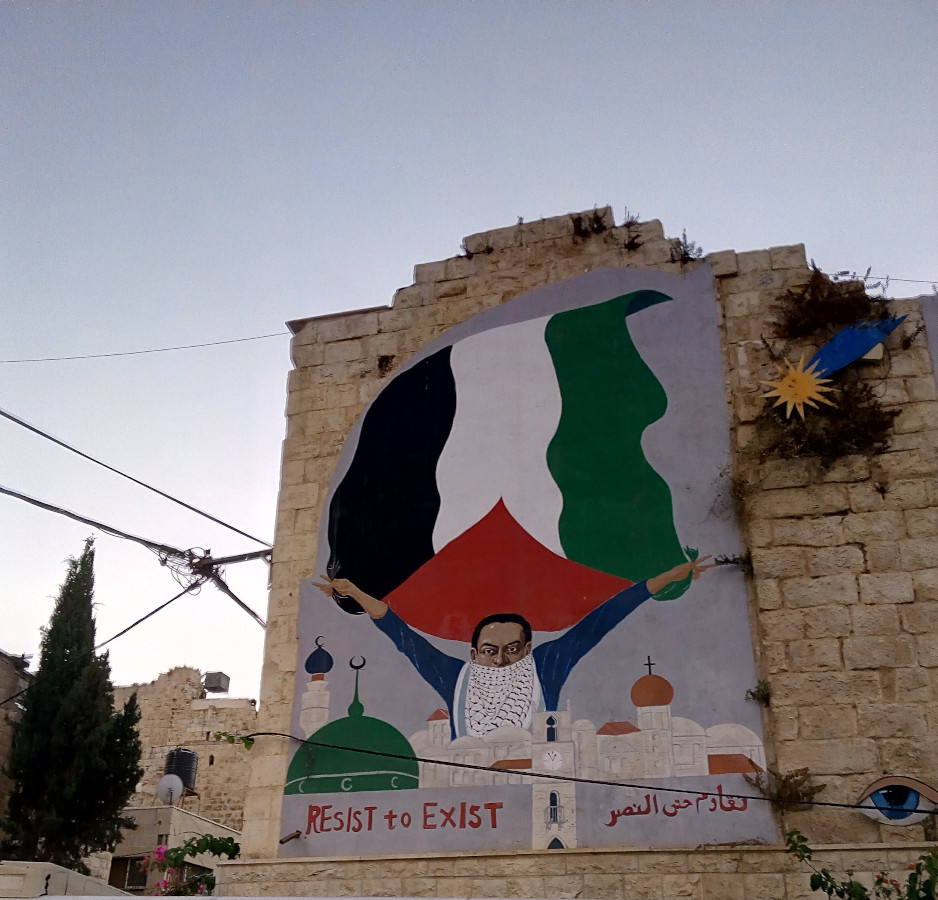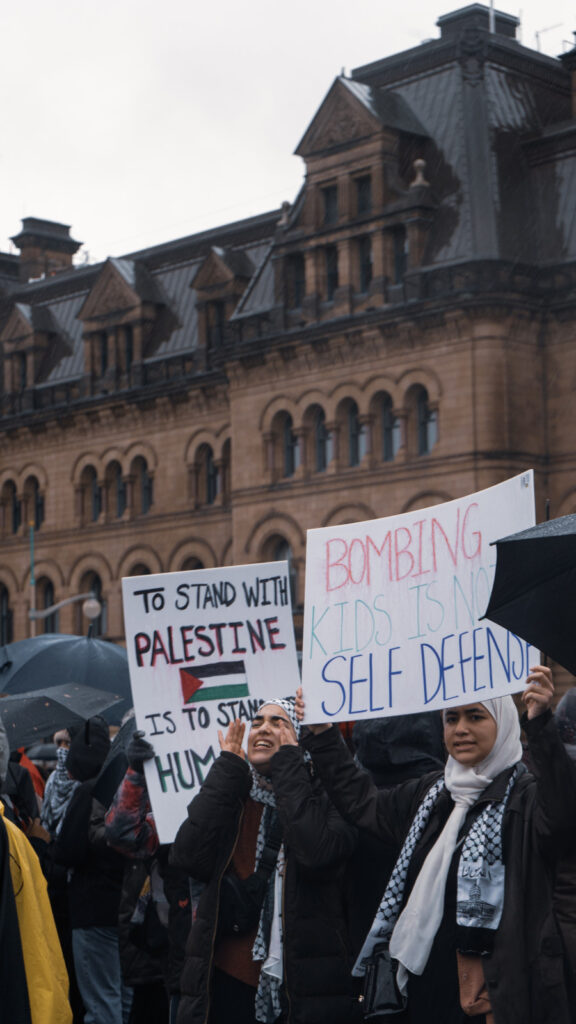The algorithm swiftly gets it –yes, I am sucked in by news about Gaza- and collapses my social media platforms’ feeds into a monothematic thread that mirrors my recently (re)ignited preoccupation with the genocide of the Palestinian people. A Middle Eastern, female illustrator’s art work I started following on Tuesday shows up at the top of the screen. Her drawing of Wadie Al Fayoume – white eyeballs, embraced in an arch of red flowers, the same gesture and the same happy birthday hat he wears in the pictures that have circulated online after his killing – precedes the onset of my scrolling through the tawdry spectacle of death with an uncanny allusion to what it might have looked like to be alive.

After him, startled faces of terrified children, blood-dripping foreheads, cheeks covered in trails of tears and dust unfurl a grotesque witnessing of suffering; I am not immune to their affective power. ‘You Muslims must die’, the news says Wadie Al Fayoume’s murderer said before stabbing him to death in his house in Chicago. The pungent rawness of blurry video footages from Gazan hospitals revolts me, as they become, like Wadie, animated traces of lives that might soon be, if they are not yet, lost.
The narrative and visual dimensions of social media portraits of ‘what is going on in Gaza’ invert the effacing of the traces of the living that numbers on the news do, but they do so through a grammar of compassion for ‘all souls lost’ – the recognition of those as (former) living beings, and thus, Judit Butler would argue, the assertion of their grievability – with which a staggering surge of posts unreflectively registers a moral inflection toward neutrality. What I find more disturbing is not the invocation of a denial of what is in fact the very real differential distribution of grievability that is at work in such sites of violence, but how the ‘both-sides’ -or ‘no sides’- rhetoric, articulated by people who bestow themselves with the title of ambassadors of a common humanity, is oblivious to the fact that Palestinian children are not really apprehended as living until they are dead.
When the suffering of some is rendered accessible only when it can be equalized to that of others, the presumably uncomplicated language of a universal value of lives carries in fact the implicit recognition, by virtue of its omission, of what the battlefield makes evident: not all lives are counted as livable. Representations of common suffering elicit in fact interrogations of what counts as humanity, for they mobilise the term as if it were an empty signifier, sliding into ethically unfixed questions of what –and when this what– is a livable and grievable life, and what -and when- it is not. In positing a fantasy of equivalences, they omit the fact that in denying them the social conditions that enable the persistence, sustainment and thriving of life, Israel deprives Palestinians of life even before they are killed, inevitably tapping from a moral economy of suffering in which Palestinian deathis historically normalized and socially reified.
In a sort of collective aphasia (Stoler, 2011), accounts of suffering and pain are measured against each other through a grammar of false equality between what the colonizer’s absolute right to kill differentiates in terms of valuable and non-valuable lives. The long-standing pervasiveness of colonialism, dispossession and killing power becomes muffled; its monopolization of an unlimited right to self-defense denied in historically illiterate proposals of peacebuilding rooted in Solomonic repartitions of the territory and allocations of quasi sovereignties. Framings of the violence that often accompany such accounts as a ‘war’, or a ‘conflict’, often uncritically registering the tensions at stake through the performative solidarity of posting two flags together, raise unsettling questions about how the equation of the suffering of ones to the suffering of others – or the recognition of their shared humanity – seems so often to acquire meaning alongside a conceptual erasure of the long-standing power imbalances between the sides. To talk of suffering in order to speak about domination, Didier Fassin argues, is to do morals and politics with new words (2008: 532); but what kind of morals and politics are done by the omission of colonial domination that the articulation of frameworks of universal suffering seem to convey?
At the forefront of many calls for action, reflections on grief and loss, and denunciations of the ongoing violence ‘in and around’ the Gaza Strip are children whose suffering bodies, like those of Wadi or the children in hospitals in Gaza, seem to convey a sort of humanitarian discourse of ‘antipolitical moralism’ (Ticktin, 2011: 64). Children occupy, of course, a key place in dominant imaginations of the human and of the ‘world community’ (Malkii 2011), and they do so, in the case that concerns us here, by condensing very particular forms of violence into a moral problematization.
‘It is not a political view but a human response’ declares a dance school in London in their Instagram stories, now gone, imbuing the devastation felt for ‘the loss of innocent lives, especially children’, with a sort of affective affordance that attempts to justify a denial of the politics that are layered in the attribution of differential value to the lives of ones and the lives of the others. A pretension of depoliticisation that invokes in fact a very particular politics, one that reproduces the effacing of the precise context in which violence takes place. In those posts, the continued allegiance to the alleviation of suffering and the condemnation of violence emerges through a language of crisis and urgency that reproduces a particular genealogy of violence and reparation in abstract terms: victims are dispossessed of perpetrators; suffering bodies imagined outside of history and politics; they require help only out of a moral obligation (see Ticktin, 2011).
‘Let these poor innocent children be’ a Bristol based printmaker writes as a concluding demand, posting from the same city where I am. To be what? I wonder; what were Palestinian children being targeted by Israel’s last offensive? What kind of lives, if lives at all, were they living?
The idea of a morally legitimate suffering body collapses again in the figure of children in the words of Arab Israeli politician and journalist Aida Touma-Sliman: ‘a child is a child’; for which she is reprimanded by Knesset member Meirav Ben-Ari with invocations of a lack of symmetry that goes in fact the other way around. Toulam-Sliman is right, but she is also not; a child might be a child within the frames of humanitarian values, but in the rationality of occupation, a Palestinian child is not the same child.

In a public endorsement of the ongoing collective punishment against the Palestinian population, Meirav Ben-Ari declares that ‘the children of Gaza have brought this upon themselves’. In this rhetorical unravelling of a selective production and undoing of victims, Hamas’ attacks prove Gazan children’s culpability for their own victimization. Participants of war, children are a ‘category mistake’, Malkki (2010) would say, used in this case to deny the pretension of our shared humanity. Children are, in the colonizer’s rhetoric, perpetrators; they are Hamas’ human shields. They are, as Butler has argued, no children at all, ‘but rather bits of armament, military instruments and materiel’ (2016). The grammar of compassion with which the morally legitimate bodyof the child – and the fantasy of the equal grievability of its life in comparison to Israeli lives – is upheld fails to acknowledge that in the occupied territories, Palestinian children are not really alive as such. They are nothing but a threat against which an absolute power defends the lives of some and destroys the lives of others as it formulates itself. They are like rocks and steel, darkness in human form, a haunting specter of the pervasive threat of terrorism in its developing potentiality.
As highly politically charged sites, Palestinian children embody indeed the racial politics of reproduction that underpin Israel’s colonial settlement project. Perhaps because in the colonizer’s war on demographics Palestinian reproduction stands in the way of the continued success of colonization (Kanaaneh, 2002; Shalhoub-Kevorkian, 2015), Palestinian children are produced through the inscription of colonial power in their mothers’ bodies not as made of flesh and bones, but as traces of an unruly destructive power.
On October the 17th, the Israeli Prime Minister posts on Twitter: ‘this is a struggle between the children of light and the children of darkness, between humanity and the law of the jungle’. In the now deleted post, a divide operates through a narrative of impossible dichotomies between light and darkness, between humanity and savageness, mirroring the ubiquitous distortion of Palestinian people that articulates the same discourses that reproduce the frames of recognition in which their lives are considered nothing else but a threat to the survival of others. Perhaps in his post Benjamin Netanyahu uses Niebuhr’s novel’s title to refer to such an existential battle, yet the mention of children reinforces its emergence as a powerful signifier that seams together, even if in complicated ways, universalist understandings of humanity and the precise denials of it.
In what terms can this ‘poetics of our common humanity’ (Malkki, 2011) that permeates social media feeds not lose sight of the context in which such disturbing category mistakes – the, literally, ‘children’ of darkness – are produced? In what ways can such calls for compassion – which reify the moral authority with which children, presumably holders of an innocent, unadulterated, presociality (Malkki, 2011; see also Butler, 2016), are often indexed – be attentive to the everyday forms of criminal brutality that deny their mere existence as humans?
That there is no justification for the targeting of children, or any civilian of any age, is unquestionable. Yet, the way such claims for equidistance seem so often to compress the history of racialized and settler colonial domination into a ‘war against humanity’, obscure the frames in which Palestinian children’s lives are lives that are not only constrained and cut short, but that are ontologically already lost, placed ‘outside of humanity’, ‘dark matter’.
Júlia Fernandez is a PhD candidate in Social Anthropology at the University of Edinburgh. She specializes in reproduction, care and forced migration. She has conducted research in the West Bank before, focusing on gender and political resistance.
References
Butler, J. (2016): Frames of war: When is life grievable? Verso, London.
Fassin, D. (2008): The Humanitarian Politics of Testimony: Subjectification through Trauma in the Israeli: Palestinian Conflict. Cultural Anthropology, Vol. 23, No. 3, pp. 531-558
Kanaaneh, R. (2002): Birthing the nation: Strategies of Palestinian women in Israel. University of California Press.
Malkki, L. (2010): ‘Children, Humanity, and the Infantilization of Peace’, in Ticktin and Feldman (eds): In the name of humanity: the government of threat and care. Durham, Duke University Press.
Shalhoub-Kevorkian, N. (2015): The politics of birth and the intimacies of violence against Palestinian women in occupied east Jerusalem. The British Journal of Criminology, Vol. 55, No. 6, THEMED ISSUE: In the Aftermath of Violence: What Constitutes a Responsive Response? pp. 1187-1206
Stoler, A. (2011): Colonial Aphasia: Race and Disabled Histories in France. Public Culture, Vol. 23, No. 1, pp. 121-156
Ticktin, M. (2011): Casualties of Care: Immigration and the Politics of Humanitaranism in France. Berkeley, University California Press.
Cite as: Fernandez, Júlia 2023 “Outside of Humanity: Palestinian Children and the Value of Life” Focaalblog 31 October. https://www.focaalblog.com/2023/10/31/julia-fernandez-outside-of-humanity-palestinian-children-and-the-value-of-life/